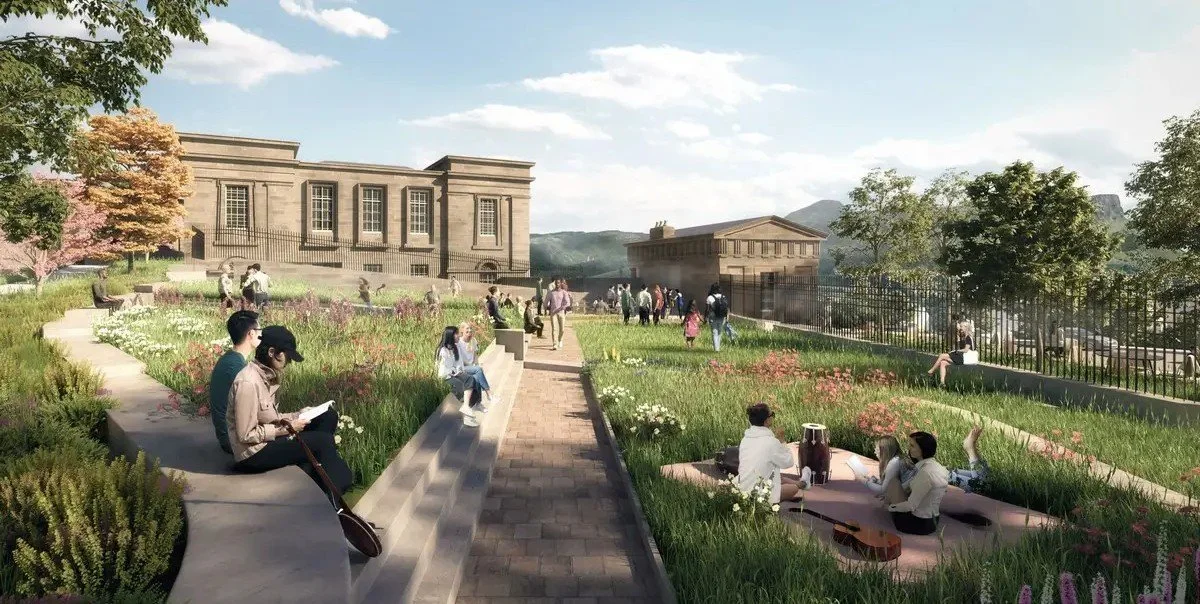Interview with Carol Main, Chair of the National Centre for Music
Shortly after Carol Main stepped down from her post as Director of Live Music Now Scotland, she was appointed Chair of the National Centre for Music, currently a work in progress on Edinburgh’s Calton Hill. Recently I spoke to Carol about the organisation and her hopes for the Centre in the next year and after it opens at the end of 2027.
Currently two teams are working on the project, linked and in regular communication but each with its own role. The Royal High School Preservation Trust is in charge of the fundraising and the building project which will transform the former school into a 21st century music centre. Of the £70 million fundraising target over two thirds has already been secured, with £5million lottery money and funding from the Dunard Fund and others already pledged.
Most Edinburgh residents are familiar with the Old Royal High School at least from the outside, and also from its occasional use as a venue for drama and music. The ambitious plans aim to preserve and modernise the main performance spaces, the central hall seating 300 and the octagons on either side seating 100 in each. There will also be recording studios and meeting/teaching rooms, a bar in the arched basement, and a café with terrace space outside. A striking feature will be the garden, the largest public garden developed in Edinburgh since Princes Street Gardens. The garden will have a music theme, still to be agreed, and will incorporate outdoor performance spaces. The fly-through video gives a good sense of the space.
First look inside Scotland’s National Centre for Music | Watch
Jenny Jamison, with a background in music administration, latterly with the Scottish Ensemble, is the CEO and Creative Director of the Centre, and is in the process of recruiting further members of staff, including a Director of Partnerships (just announced) and then for a post to take charge of marketing. Jenny has also been engaged in extensive consultations at different venues across the country.
Carol’s position as Chair of the Board is unpaid and she’s very clear about the importance of separating the Board’s advisory and supportive role from the executive function of the paid staff. Her appointment was widely welcomed: with her extensive background in music administration, she has a network of contacts to draw on and to pass on to her colleagues. She’s been recruiting other Board members, and is delighted with the wide music backgrounds from which they’ve come. Jeff Sharkey is the Principal of the Royal Conservatoire of Scotland; Annie Gunner-Logan , who’s worked in senior public policy roles, is also a singer song writer for her group AGL and the Alchemists; James Murphy is from the Royal Philharmonic Society and Emma Houston is a prominent marketing manager.
The funding of the work of all of these teams has been guaranteed for the period up to the opening, scheduled for late 2027, and for the first operational year.
Recruitment for staff members and for Board members will be ongoing throughout the next year. It’s important, Carol says, that this is phased, as each person brings a specific set of skills which should link or complement those already in post. Currently the Centre has just successfully recruited the key role of Director of Partnerships, who will establish relationships with the bodies and individuals who will use the centre, both its physical spaces in Edinburgh and the expertise of its staff. There is much work to be done this year liaising with local government and music facilities and events throughout the country, discussing what the Centre can offer which is additional to the facilities and events which each organisation already has. Carol foresees that the Centre might act as a satellite for some of the smaller Festivals, sharing initiatives and musicians, possibly by providing the space for further performances of new music, and by sharing digital technology.
When asked who the centre is for, Carol says “Everybody!” It will welcome all kinds of music groups to rehearse and perform in the spaces, and use the offices and recording equipment. There will be discussions about the prices charged but with the emphasis on accessibilty and affordability. The Centre will also curate a programme of its own concerts and events, indoors and in the garden. The Dunard Centre, due to open in 2029, will be a near neighbour, and Carol sees the National Music Centre’s role as being complementary to the new Concert Hall.
2026 and 2027 will be exciting years for all concerned. Branding, or making the public aware of the Centre, will be an essential part of Carol’s role and that of her fellow Board members. At some point the centre will be given a name. She is an enthusiastic advocate of the potential for the Centre to boost musical creativity in Scotland, and all music lovers should look forward to its opening in 2027.
“The building”, Carol Main says, “has strong foundations. My role as Chair is to create strong foundations for the project and its future.”
